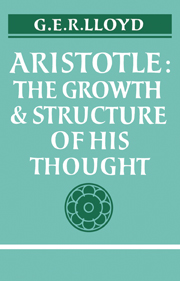Book contents
- Frontmatter
- Contents
- Preface
- Abbreviations
- PART I INTELLECTUAL DEVELOPMENT
- PART II FUNDAMENTALS OF ARISTOTLE'S THOUGHT
- 6 Logic and metaphysics
- 7 The physics of the heavenly region
- 8 The physics of the sublunary region
- 9 Psychology
- 10 Ethics
- 11 Politics
- 12 Literary criticism
- 13 Conclusion
- Suggestions for farther reading
- Glossary of Greek terms
- Index of passages referred to
- General Index
12 - Literary criticism
Published online by Cambridge University Press: 06 July 2010
- Frontmatter
- Contents
- Preface
- Abbreviations
- PART I INTELLECTUAL DEVELOPMENT
- PART II FUNDAMENTALS OF ARISTOTLE'S THOUGHT
- 6 Logic and metaphysics
- 7 The physics of the heavenly region
- 8 The physics of the sublunary region
- 9 Psychology
- 10 Ethics
- 11 Politics
- 12 Literary criticism
- 13 Conclusion
- Suggestions for farther reading
- Glossary of Greek terms
- Index of passages referred to
- General Index
Summary
Aristotle nowhere puts forward a developed aesthetic, nor even a complete theory of literary criticism. Yet despite the gaps and limitations of his discussion and the extreme obscurity of some of his ideas, he went further in his analysis of the aims and nature of poetry than any earlier writer. His defence of the usefulness of poetry provided an important antidote to Plato's criticisms and rejection of it, and his work in this field was to prove enormously influential.
The ‘Rhetoric’
He discusses literary style in two treatises, the Poetics and the less well known Rhetoric. To deal briefly with the Rhetoric first, that work, as its name suggests, is an analysis of the art of public speaking. The scope of rhetoric and its relation to philosophy had been topics of some dispute which Plato had discussed at length in the Gorgias and the Phaedrus. Aristotle defines it as the faculty of discovering the possible means of persuasion with regard to any subject (Rh. 1355 b26f.). It is a counterpart to or offshoot of dialectic, which he had discussed in the Topics. Both deal with probabilities, and as such they are both contrasted with the study of strict demonstration or scientific proof, the subject-matter of the Analytics. But while dialectic proceeds by question and answer, the orator uses continuous speech, exercising his skill in three main fields: (1) political, (2) legal, and (3) ceremonial, oratory.
- Type
- Chapter
- Information
- AristotleThe Growth and Structure of his Thought, pp. 272 - 282Publisher: Cambridge University PressPrint publication year: 1968



